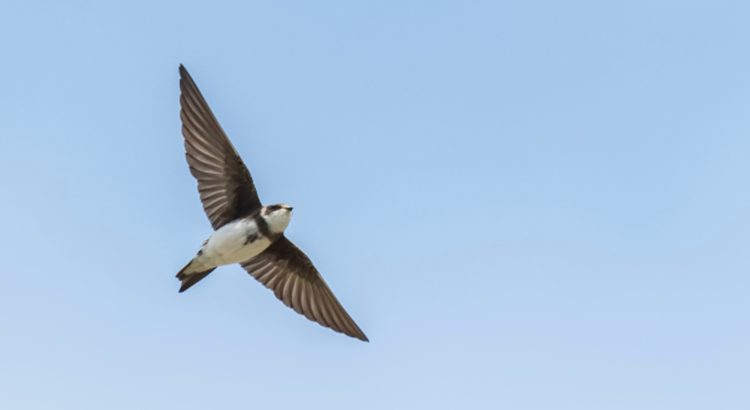
Bank swallows (Riparia riparia) are insectivorous songbirds with a distinctive dark brown breast band separating their brown upperparts from their white underparts. Known for their fast, agile flights, these small passerines can be seen buzzing acrobatically through the air along Prince Edward Island’s coasts during the spring and summertime. Bank swallows nest colonially in sandstone cliffs, till bluffs, high sand dunes, and sand pits. As they fly over nearby meadows, wetlands, and agricultural grasslands they forage on insects like beetles, wasps, bees, flying ants, and mayflies. Based on this feeding strategy, bank swallows belong to a guild of birds called aerial insectivores. Like many aerial insectivores, bank swallow populations in Canada are declining due to threats contributing to the loss of their breeding and foraging habitats: land use changes and associated agricultural intensification, and the practice of shoreline armouring. Bank swallow may also be indirectly impacted by pesticide use, which reduces the abundance and availability of their insect prey. In recognition of these threats, bank swallow was listed as a threatened species under the Species at Risk Act (SARA) in 2017.

Island Nature Trust began monitoring bank swallow populations in Prince Edward Island in 2013 but monitoring efforts have intensified in recent years. Staff, along with partner group sand volunteers, focus their monitoring efforts around inventorying the Island’s coastline for bank swallow colonies. A lot of hard work and kilometers of walking go into locating colonies! Staff then monitor these colonies to confirm the occurrence of nests. During 2022, Island Nature Trust staff and volunteers surveyed 53 km of shoreline and located 42 new colonies, bringing the total number located since 2020 to 142. Staff also re-visited 25 previously located colonies. If you know the location of an active bank swallow colony, don’t hesitate to reach out to Island Nature Trust staff by phone or email! Your knowledge about colony locations can help expand knowledge about bank swallow across our Island.

Although bank swallows won’t return to the Island until spring, stay tuned for volunteer training opportunities in the first quarter of 2023. Island Nature Trust is looking to recruit volunteers interested in becoming Coastal Guardians for bank swallows. Examples of guardian activities include surveying for active bank swallow colonies, speaking to members of the public about bank swallow conservation, and reporting relevant data to Island Nature Trust staff to be included in a larger, Atlantic Canada-wide dataset. If you are a current Coastal Guardian, we are designing a new tool to capture your observations about bank swallow arrival and nest initiation dates. Keep an eye on your inboxes in the upcoming months for more information! Island Nature Trust would like to thank Environment and Climate Change Canada and the PEI Wildlife Conservation Fund for making this work possible.

